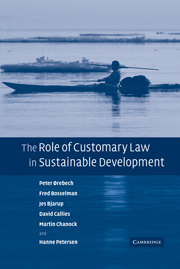Book contents
- Frontmatter
- Contents
- Preface
- Acknowledgements
- Table of cases
- List of international conventions
- Introduction
- 1 The linkage between sustainable development and customary law
- 2 Three case studies from Hawaii, Norway and Greenland
- 3 Social interaction: the foundation of customary law
- 4 How custom becomes law in England
- 5 How custom becomes law in Norway
- 6 Adaptive resource management through customary law
- 7 The place of customary law in democratic societies
- 8 Customary law, sustainable development and the failing state
- 9 Towards sustainability: the basis in international law
- 10 The case studies revisited
- 11 The choice of customary law
- 12 Conclusion: customary law in a globalizing culture
- References
- Index
- Authors index
3 - Social interaction: the foundation of customary law
Published online by Cambridge University Press: 18 December 2009
- Frontmatter
- Contents
- Preface
- Acknowledgements
- Table of cases
- List of international conventions
- Introduction
- 1 The linkage between sustainable development and customary law
- 2 Three case studies from Hawaii, Norway and Greenland
- 3 Social interaction: the foundation of customary law
- 4 How custom becomes law in England
- 5 How custom becomes law in Norway
- 6 Adaptive resource management through customary law
- 7 The place of customary law in democratic societies
- 8 Customary law, sustainable development and the failing state
- 9 Towards sustainability: the basis in international law
- 10 The case studies revisited
- 11 The choice of customary law
- 12 Conclusion: customary law in a globalizing culture
- References
- Index
- Authors index
Summary
Knowledge, law and custom
This chapter is concerned with knowledge, law and custom. Custom and law are ways to regulate the behavior or conduct of human beings that raise the practical question for the individual what to do that in turn is related to the epistemological question what to believe. Action depends upon belief, and I shall begin with the epistemological question to be illustrated by reference to the naturalistic view advanced by David Hume and the criticism put forward by Thomas Reid. Hume sets out to destroy the received view of knowledge grounded in reason based upon the conception of man as born in god's image and to replace it with the naturalistic view of knowledge grounded in experience based upon the conception of man as an intelligent animal, to be presented in Section 3.2. The former conception of man has been advanced to support the personal perspective of the epistemic authority of the individual knower grounded in rational insight into the nature of things that is rejected by Hume in favour of the naturalistic view that grounds knowledge in experience based upon custom. However, Hume's naturalistic view is still committed to the personal perspective of knowledge as an individual achievement since Hume only relies upon his own experience as a judicious spectator of the world. Hume's naturalistic view has been influential in the scientific pursuit of knowledge since it supports the epistemic authority of scientists as impartial and disinterested spectators of the world.
- Type
- Chapter
- Information
- The Role of Customary Law in Sustainable Development , pp. 89 - 157Publisher: Cambridge University PressPrint publication year: 2006



